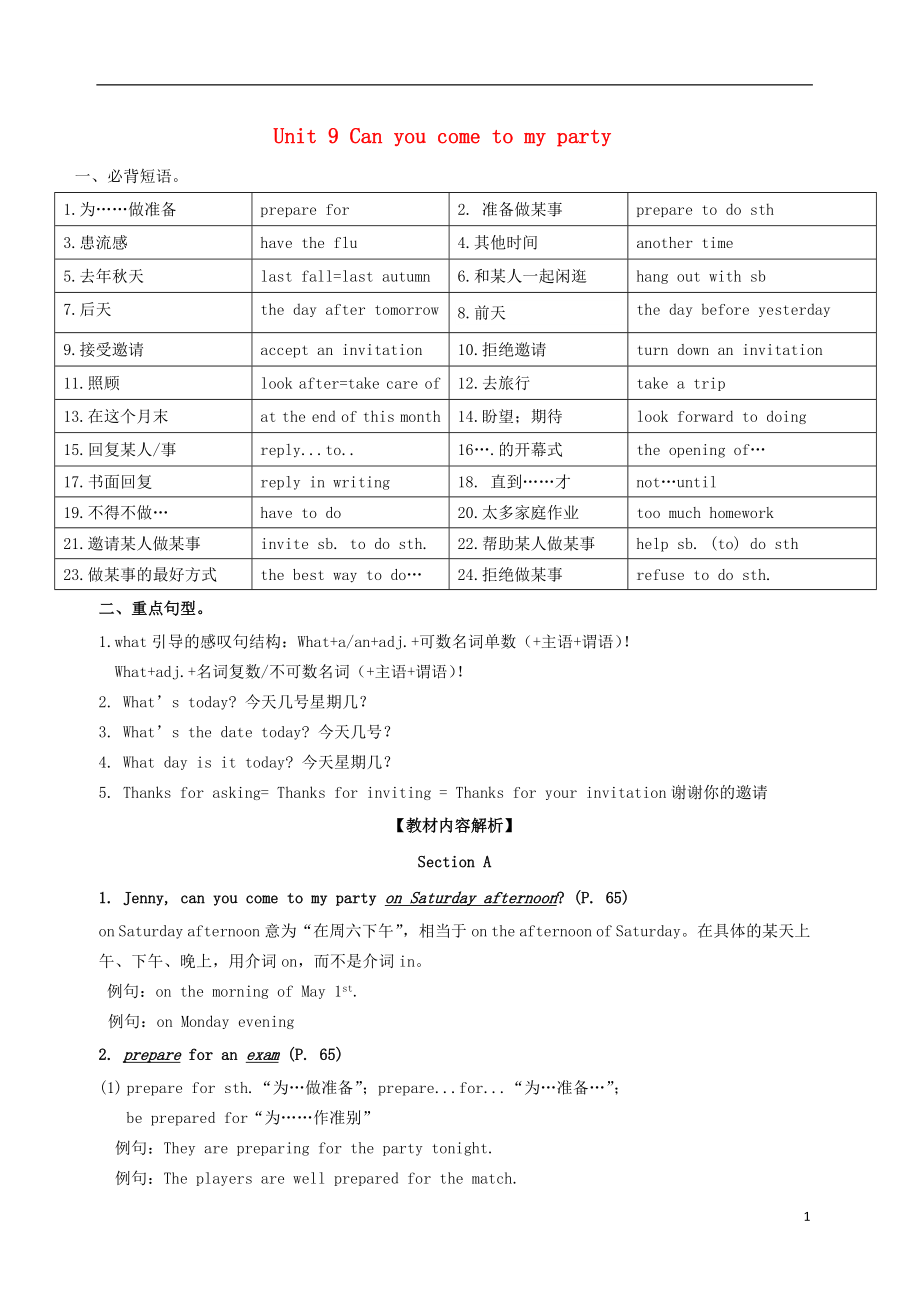 八年级英语上册Unit9Canyoucometomyparty短语语法知识点汇总新版人教新目标版20180814410
八年级英语上册Unit9Canyoucometomyparty短语语法知识点汇总新版人教新目标版20180814410



《八年级英语上册Unit9Canyoucometomyparty短语语法知识点汇总新版人教新目标版20180814410》由会员分享,可在线阅读,更多相关《八年级英语上册Unit9Canyoucometomyparty短语语法知识点汇总新版人教新目标版20180814410(5页珍藏版)》请在装配图网上搜索。
1、Unit 9 Can you come to my party一、必背短语。1.为做准备prepare for2. 准备做某事 prepare to do sth3.患流感have the flu4.其他时间 another time5.去年秋天 last fall=last autumn6.和某人一起闲逛hang out with sb7.后天 the day after tomorrow8.前天 the day before yesterday9.接受邀请accept an invitation10.拒绝邀请turn down an invitation11.照顾 look after=t
2、ake care of12.去旅行 take a trip13.在这个月末 at the end of this month14.盼望;期待 look forward to doing15.回复某人/事reply.to.16.的开幕式 the opening of17.书面回复 reply in writing18. 直到才notuntil19.不得不做have to do20.太多家庭作业too much homework21.邀请某人做某事invite sb. to do sth.22.帮助某人做某事help sb. (to) do sth23.做某事的最好方式the best way t
3、o do24.拒绝做某事refuse to do sth.二、重点句型。1.what引导的感叹句结构:What+a/an+adj.+可数名词单数(+主语+谓语)!What+adj.+名词复数/不可数名词(+主语+谓语)!2. Whats today? 今天几号星期几? 3. Whats the date today? 今天几号? 4. What day is it today? 今天星期几?5. Thanks for asking= Thanks for inviting = Thanks for your invitation谢谢你的邀请【教材内容解析】Section A1. Jenny,
4、can you come to my party on Saturday afternoon? (P. 65)on Saturday afternoon意为“在周六下午”,相当于on the afternoon of Saturday。在具体的某天上午、下午、晚上,用介词on,而不是介词in。例句:on the morning of May 1st.例句:on Monday evening2. prepare for an exam (P. 65)(1) prepare for sth.“为做准备”;prepare.for.“为准备”;be prepared for“为作准别”例句:They
5、are preparing for the party tonight.例句:The players are well prepared for the match.(2) exam作名词,表示“考试”,take/have an exam参加考试。例句:We will take the final exam next week.3. Im sorry. Im not available. (P. 66)available作形容词,表示“有空的、可利用的”,常用作表语,相当于free。例句:Are you available tonight? 4. Oh, but Sam isnt leavin
6、g until next Wednesday. (P. 66)until表示“直到”和延续性动词动词连用,意为一个动作一直持续到某个点为止;同短暂性行动连用时,用于“not.until”结构中,表示“直到才”。例句:The boy waited in the school until his father came to pick him up.例句:The workers wont leave until they get their salary(薪资).5. Can you hang out with us on Monday night? (P. 66)hang out表示“闲逛、常去
7、某处”。例句:He likes reading so he often hangs out in the bookshop.6. Im afraid not. (P. 66)Im afraid.意为“恐怕”,Im afraid not意为“恐怕不能”,表示肯定意义时,用Im afraid so“恐怕如此”。例句:-Can you go to the concert?-Sorry, Im afraid not.例句:-Is she very ill?-Im afraid so.7. Inviting (P. 67) invite sb. 邀请某人例句:They invited lots of g
8、uests to their wedding. invite sb. to do sth. 邀请某人做某事例句:We invited a professor to give a speech. 我们邀请教授发表演讲。8. Accepting (P. 67)accept表示“接受”,反义词是refuse。例句:I can accept his invitation.【拓展】 accept强调主观上愿意接受,receive意为“收到、接到”,常同from连用;另外,receive表示客观上收到或者拿到,但主观上不一定接受。例句:I was happy to receive a call from
9、my old friend.例句:I received his gift yesterday, but I wouldnt like to accept it.9. Refusing (P. 67)refuse表示“拒绝”时,后常接名词或者动词不定式作宾语。例句:Most of the residents refused to move away from here.Section B1. weekday (P. 68)weekday表示“工作日”,on weekdays意为“在工作日”。例句:Dont drink on weekdays.2. Look after his sister (P
10、. 68)look after意为“照顾、照料”,相当于take care of。例句:He is old enough to look after himself.3. turn down an invitation (P. 69)turn down此处表示“拒绝”,相当于refuse。例句:He turned his friends advice down.4. She helped me to improve my English so much. (P. 69) help sb. with sth. 帮助某人某事例句:Can you help me with my homework?
11、help sb. (to) do sth. 帮助某人做某事例句:He often helps his mother clean do housework.5. Im sad to see her go, and this party is the best way to say “Thank you and goodbye.”(P. 69) see sb. do sth. 意为“观看,某人做某事”,强调全过程或者经常发生;see sb. doing sth.“观看某人正在做某事”。例句:I often watch my father ride a horse in the garden.例句:
12、Linda watches her friends playing football.6. My family is taking a trip to Wuhan at the end of this month to visit my aunt and uncle. (P. 69) (1) take a trip意为“去旅行”,相当于go on a trip。例句:Are you going to take a trip this summer vacation?(2) at the end of意为“在末尾、在尽头”;by the end of“到末为止”;in the end“最后、终于
13、”。例句:At the end of this month, we will have a test.7. However, Id still be glad to help out with any of the party preparations, like planning the games. (P. 69) (1) help out表示“帮助解决问题”。例句:Do you need anyone to help out in the shop?(2) preparation是动词prepare的名词形式,make/do preparations for“为做准备”。例句:We ma
14、de preparations to move to a new office.8. Bring Ms. Steen to the party without telling her so that she can be surprised. (P. 69)so that引导目的状语从句,意为“以便、为了”,相当于in order that,其从句的谓语动词常和can/could/would/should连用。例句:My father bought me a bicycle so that I could get to school quickly.9. I look forward to h
15、earing from you all. (P. 69)(1) look forward to意为“期待、盼望”,后接名词、代词或者动名词做宾语。例句:Cindy is looking forward to his birthday party.例句:We are looking forward to meeting the film star.(2) hear from sb. 意为“收到某人来信”,相当于get/receive a letter from sb.。例句:It was great to hear from you.例句:Yesterday I heard from my pe
16、n friend.10. Hope you can make it! (P. 70)make it可以表示“把时间定在”或者“成功办成某事”。例句:Lets make it 8 oclock this evening.例句:After years of hard work, he finally succeeded.11. Please reply in writing to this invitation by Friday, December 20th. (P. 71)(1) reply既可以用作名词也可以用作动词,作动词时常同介词to连用。例句:Dont worry. I will ma
17、ke a reply to this question.I didnt reply to his letter.(2) by Friday意为“在周五之前”,介词by表示“不迟于、在之前”。例句:Can you finish the work by tomorrow?【语法讲解】情态动词can的用法情态动词是表示说话人的语气或情态,本身有词义但不能单独作谓语的词。常用的情态动词有can,may,must,could,shall,will,need等。情态动词在句中必须后跟动词原形,并与后面的动词一起构成谓语。情态动词没有人称和数的变化。1、 情态动词can的用法:(1) 表示能力,意为“能,会
18、”。例如:Millie can play the piano.(2) 表示许可,意为“可以”。例如:You can use my pen. Can you pass me the books?(3) 表示推测,意为“可能,会”,主要用于否定句和疑问句中。例如:Can he be here? He cant have finished his homework.2、 情态动词could的用法:(1) could是can的过去式,表示过去的能力,意为“能,会”。例如:Could you speak English at the age of six? His mother is a good co
19、ok now, but she couldnt cook meals three years ago.(2) 在某些场合,could可用来代替can,表示现在的情况,could比can语气更委婉。若用could来提问问题,回答时,应该用can,而不用could。例如:-Could you answer me a question? -Yes, I can./No, I cant.3、 情态动词may的用法:(1) 表示许可,意为“许可”。例如:May I come in? You may take everything you like. (2) 表示推测,通常用于肯定句和否定句中,意为“可能”。例如:He may be very busy now. He said that she might not be at work today.注意:can和may都不是可能性,can通常用于否定句和疑问句中,而may通常用于肯定句和否定句中。虽然两者均可用于否定句中,但其意思不同:cant意为“不可能”,may not意为“可能不”。另外,can和may均可表示请求允许,但can为一般用词,而may为正式用词。例如:It cant be true.那不可能是真的。 It may not be true.那可能不是真的。5
- 温馨提示:
1: 本站所有资源如无特殊说明,都需要本地电脑安装OFFICE2007和PDF阅读器。图纸软件为CAD,CAXA,PROE,UG,SolidWorks等.压缩文件请下载最新的WinRAR软件解压。
2: 本站的文档不包含任何第三方提供的附件图纸等,如果需要附件,请联系上传者。文件的所有权益归上传用户所有。
3.本站RAR压缩包中若带图纸,网页内容里面会有图纸预览,若没有图纸预览就没有图纸。
4. 未经权益所有人同意不得将文件中的内容挪作商业或盈利用途。
5. 装配图网仅提供信息存储空间,仅对用户上传内容的表现方式做保护处理,对用户上传分享的文档内容本身不做任何修改或编辑,并不能对任何下载内容负责。
6. 下载文件中如有侵权或不适当内容,请与我们联系,我们立即纠正。
7. 本站不保证下载资源的准确性、安全性和完整性, 同时也不承担用户因使用这些下载资源对自己和他人造成任何形式的伤害或损失。
